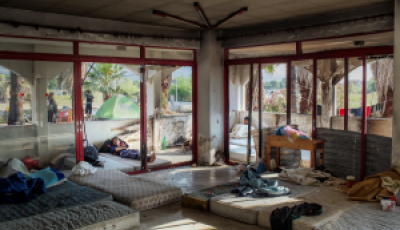No Welcome for Migrants and Refugees Landing in Greek Dodecanese Islands
Posted:
Time to read:
Guest post by Stathis Kyroussis, MSF Head of Mission for Balkan projects.This post is the fifth installment of the Border Criminologies Themed Week on the Migrant Crisis in Greece organised by Angeliki Dimitriadi.
There has been a sharp increase this year in the number of people arriving in Greece and especially on the Dodecanese islands, fleeing war, violence, and poverty in their home countries. Since the beginning of this year, more than 46,000 refugees have arrived in the Greek islands by sea from Turkey in inflatable dinghies. More than 14,000 refugees have arrived in the Dodecanese islands. Since March 2015, MSF has been working on the island of Kos to provide care to newly arrived migrants and refugees. The majority of newly arrived people is sleeping in or around the Hotel Captain Elias―a dilapidated abandoned building on the outskirts of Kos town. Hundreds of people sleep wherever they can find a space, in hallways, staircases, and on the dusty ground floor that used to be the hotel lobby.

On the rooftop of the Captain Elias camp, Muhammed, 26 years old, who left Afghanistan a bit over a month ago, recounts his experience of being an asylum seeker. Having travelled to Kos through Iran and Turkey, he’s preparing a meal for himself and his three travel companions, among the shattered glass and rubble, on a small open fire.
Back in Afghanistan I was running a pharmacy and doing some teaching in a local school. I also wanted to teach women in the village how to be healthy and how to care for their children. One day, some of the men in the village came to me, accusing me of teaching Christian ideas to the children. They said, you’re not a true Muslim, very soon you will be beheaded. Then, at the same time, I discovered that everything in my pharmacy had been smashed to pieces and that my father had disappeared without any explanation. It’s now about three months since we last heard from him, and I don’t know if he is dead or alive. For this reason I decided to escape from Afghanistan, while hiding my family in another part of the country. I have come here in the hope that the governments in Europe will let us live as humans and not as animals.
Muhammed is one of the 14,000 refugees who have arrived since the beginning of the year to the Dodecanese islands by boat from Turkey. More than 90% come from countries experiencing war and conflict, primarily Syria, Afghanistan, Iraq, and Somalia.
I travelled by foot, bus and boat. The boat journey here from Turkey was very dangerous. You pay a smuggler to get onboard a rubber boat. When you pay him, he says there will only be 25 people onboard. And in the night time when you are getting in, you see that there’s already fifty people sitting in the boat and you can’t say no. They carry guns and they say they will kill you if you don’t get in. When I got in the boat I was thinking about my family, not myself. In this situation you just have to be brave. [..] I feel lucky that I made it here safely.
Instead of abandonment, what should be on offer is a state-managed package of reception services (which MSF is instead providing in the Captain Elias camp), including accommodation in decent conditions with reasonable hygiene and functioning toilets, basic health services, and clear information to migrants about where they are, what options are available, and what the next administrative steps should be.
For further information on the work of MSF in Greece, please visit: http://www.msf.org/greece.
Themed Week on the Migrant Crisis in Greece:
- Monday, 13 July: In Search of Hospitable Spaces in Times of Crises at the Margins of Europe (A. Dimitriadi)
- Tuesday, 14 July: Greece’s Other Crisis [is Europe’s Crisis] (S. Nanou)
- Wednesday, 15 July: Migrants Arriving in Athens: No Reception and No Place to Go (K. Kuschminder)
- Thursday, 16 July: The Moral Economy of Migration among Afghans in Europe (A. Monsutti)
- Friday, 17 July: No Welcome for Migrants and Refugees Landing in Greek Dodecanese Islands (S. Kyroussis)
Any thoughts about this post? Get in touch with us! Send us an email, or post a comment here or on Facebook. You can also tweet us.
__________
How to cite this blog post (Harvard style):
Kyroussis, S. (2015) No Welcome for Migrants and Refugees Landing in Greek Dodecanese Islands. Available at: http://bordercriminologies.law.ox.ac.uk/migrants-and-refugees-in-greek-dodecanese-islands/ (Accessed [date]).
Share:








